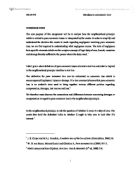The next issue to deal with is whether the duty of care on the part of Staff was breached. Staff “carelessly mixes up his notes”, and “without checking” passes on the faulty reports to Stout. He has behaved quite obviously negligently, as he has not taken the due care which he was obliged to do under his assumption of responsibility, leading to economic loss by Stout. Staff is therefore liable for the damages which Stout has incurred due to his negligence.
However, there is a problem with this case. As Staff was not employed by Stout, and was a friend, it could be argued that the advice was simply given in a social context, and Staff therefore owes no duty of care to the claimant. There are, however, some exceptions to this. If it can be proved that the agreement had a business connection, and wasn’t purely social, then a duty of care may be owed. This concept protects individuals from following advice which has been given in a social context and turns out to be false. This was established in Chaudhury v Prabhaker. In our case, there was also a business connection, as the surveyor was asked to do a specific job for a specific purpose – to provide a report on both houses so that Stout could decide which to buy. It was not simply some offhand advice being given – Staff had to physically inspect the properties and type a written report on each one. This qualifies as being a business connection, as it is going further than simply giving advice. It can therefore be seen that Stout would have a claim against Staff in negligence.
If it was decided that Staff didn’t act negligently, claims with regards to the purchasing of negligent property are treated as pure economic loss. The only loss which is suffered is paying too much for something. As it is a structural defect with the property, the “complex structure” theory doesn’t apply.
Staff and Nice
The next problem which we must consider is whether Nice has a claim for damages from Staff. If he is a 3rd party, it is unlikely that he will be able to claim damages. We must apply the same tests as were used before, beginning with proximity. The report was not intended for Nice’s use, but Nice nonetheless relied upon it being accurate to sell his house. By relying on the report as the seller, he was not a member of the “class of persons” to whom this information was to be communicated. This makes him a 3rd party, so there is no proximity. This was established in Caparo Industries plc v Dickman. Some academics have also said that the claimant must act upon the information or advice in question, thus “consummating” the reciprocal relationship between defendant and claimant. This has not been done in this case – the seller may have relied upon the survey, but they have not acted upon this information to their detriment, therefore giving insufficient proximity between the parties. There is the possibility, however, that even though he is a 3rd party, sufficient proximity could be found, although this is questionable. It could be argued that it is not unreasonable to expect the results of the survey to be communicated to the seller, and for him to rely on the results of this for the sale of his property to go through. This could, therefore, give enough proximity for Nice to make a claim against Staff, as there would be both a “special skill” being used by the defendant, and an assumption of responsibility through his actions in producing the document. This could lead to a breached duty of care on the part of the defendant. Conversely, the defendant could then argue that the claim doesn’t satisfy the reasonableness test as a causative factor; a damaging report which was later found to be incorrect could not be held to be the definitive cause of the claimant not being able to sell their house. After the error has been corrected, it is not reasonable to blame their inability to sell on the report – it could be for a number of other reasons. However, one would deduce that it seems more likely that there is no proximity between the parties, as there are more persuasive factors which weigh against it than for it.
Conclusion
In conclusion, Stout would be most likely to have a claim in negligence on the information given, as it fulfils the requirements for proximity, reasonableness, reliance, and responsibility. Although there is a question over the context in which the information was given, it seems to be clear that although the men were friends, there was a business connection between them – Staff surveyed the house as he would if he were employed to do so, making it reasonable to expect it to be done to the same professional standard.
Nice is a 3rd party, and so therefore there is no proximity between the parties, and he doesn’t act on the information given to his detriment, so Staff therefore owes Nice no duty of care. Some may argue that there is sufficient proximity, although this argument is weak and unconvincing, and it would be most likely that Nice would not have a claim in negligence.
[1,346 words including footnotes]
Bibliography
Mullis, A and Oliphant, K, Torts, Palgrave Macmillan, 3rd edition, 2003
Lunney, M and Oliphant, K, Tort Law: Text and Materials, Oxford University Press, 2nd edition, 2003
Hedley Byrne & Co Ltd v Heller and Partners Ltd [1964] AC 486
e.g. Mullis, A and Oliphant, K, Torts, Palgrave Macmillan, 3rd edition, 2003, p.72
White v Jones [1995] 2 AC 145, 288 per Lord Mustill







